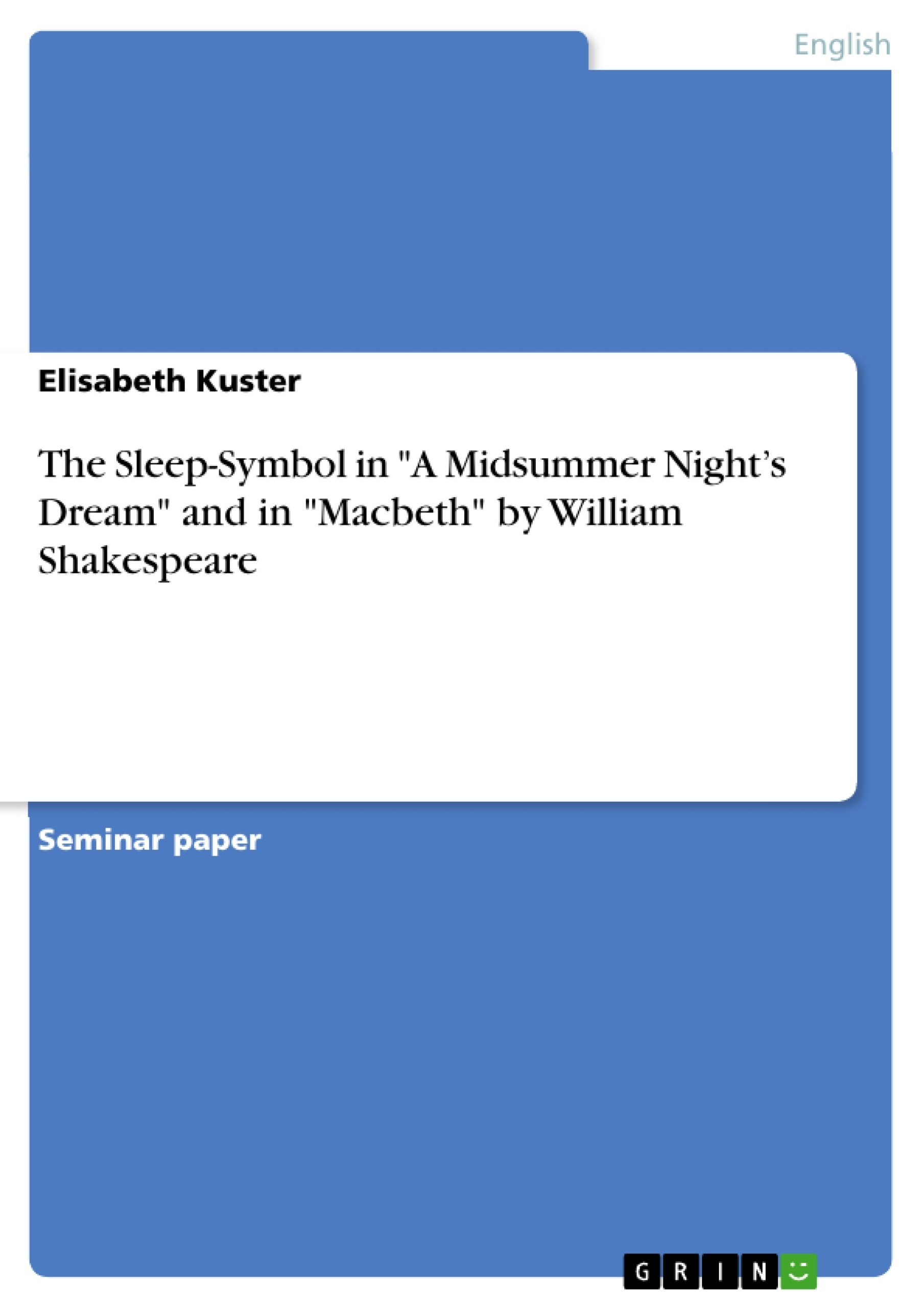This paper is about the symbol ‘sleep’ in Shakespeare’s plays “A Midsummer Night’s Dream” and “Macbeth”.
The author will discuss the definition and the role of sleep, in the two already mentioned works, in chapter 2 and 3 by analysing the symbol in detail, by giving examples and quoting relevant passages from the text. As “A Midsummer Night’s Dream” is a comedy and “Macbeth” a tragedy, these terms also have to be explained. Therefore, ‘sleep’ further has to be analysed by taking the aspects of a comedy and tragedy into consideration.
The next chapter is dedicated to the comparison of the sleep-symbol between “A Midsummer Night’s Dream” and “Macbeth”. To sum it up, the main focus of this paper is to emphasize the importance of the sleep-symbol and its consequences on the plot and outcome of the two plays (chapter 5).
Table of Contents
- Introduction
- Sleep in "A Midsummer Night's Dream"
- Sleep in Macbeth
- Comparison
- Conclusion
- References
Objectives and Key Themes
This paper explores the symbol of "sleep" in Shakespeare's plays A Midsummer Night's Dream and Macbeth, analyzing its significance and consequences on the plot and outcome of each play. The paper examines how the concept of sleep is presented differently in the comedy and the tragedy, and ultimately aims to emphasize the importance of this symbol within the broader context of Shakespeare's works.
- The symbolic meaning of sleep in Shakespeare's works
- The role of sleep in shaping the plot and characters in A Midsummer Night's Dream and Macbeth
- The contrast between sleep as a source of confusion and dreams in comedy and sleep as a symbol of darkness, madness, and guilt in tragedy
- The impact of sleep on the characters' vulnerability and their actions
- The consequences of sleep deprivation and its role in the downfall of Macbeth and Lady Macbeth
Chapter Summaries
The introduction defines the concept of a symbol and its role in literary analysis, particularly focusing on the symbolic meaning of "sleep" in Shakespeare's works. It also provides brief explanations of comedy and tragedy to contextualize the analysis of "sleep" in the two plays.
Chapter 2 analyzes the significance of "sleep" in A Midsummer Night's Dream, highlighting how sleep serves as a catalyst for confusion and dreams. The chapter examines the effects of the love potion on the characters and how their actions, fueled by sleep-induced illusions, contribute to the comedic nature of the play.
Chapter 3 explores the role of "sleep" in Macbeth. It focuses on the juxtaposition of sleep and darkness, highlighting how sleep becomes associated with guilt, madness, and ultimately, death. The chapter analyzes the consequences of sleep deprivation for both Macbeth and Lady Macbeth, demonstrating how their inability to sleep reflects their internal turmoil and fuels their downfall.
Keywords
The main keywords and focus topics of this paper include the symbol of "sleep," Shakespeare's plays A Midsummer Night's Dream and Macbeth, comedy and tragedy, confusion, dreams, vulnerability, madness, guilt, and the consequences of sleep deprivation.
Frequently Asked Questions
What does "sleep" symbolize in Shakespeare's Macbeth?
In Macbeth, sleep symbolizes innocence, which the protagonist "murders," leading to madness, guilt, and the inability to find rest.
How is sleep used in A Midsummer Night’s Dream?
In this comedy, sleep acts as a catalyst for confusion, magic, and dreams, allowing the characters to undergo transformations in the forest.
What is the main contrast between sleep in these two plays?
The main contrast lies in the genre: in the comedy, sleep leads to harmless confusion and resolution; in the tragedy, sleep deprivation leads to mental downfall and death.
How does sleep deprivation affect Lady Macbeth?
It manifests as sleepwalking and internal turmoil, reflecting her deep-seated guilt over the crimes committed to gain the throne.
Why is sleep important for the plot of A Midsummer Night’s Dream?
Because the characters are most vulnerable while asleep, allowing Oberon and Puck to apply the love potion that drives the comedic misunderstandings.
- Quote paper
- Mag. BSc Elisabeth Kuster (Author), 2006, The Sleep-Symbol in "A Midsummer Night’s Dream" and in "Macbeth" by William Shakespeare, Munich, GRIN Verlag, https://www.grin.com/document/375004



